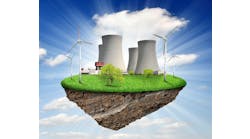Chemical engineers at Worcester Polytechnic Institute (WPI) are reportedly broadening attempts to convert waste into environmentally friendly biofuels, lowering reliance on fossil fuels, cutting the amount of municipal waste going into landfills and reducing water pollution and unhealthy emissions from petroleum products and landfills, according to WPI.
Michael Timko, associate professor of chemical engineering, has been developing ways to significantly improve the yield of biofuel that can be created from food waste. Now, with a $1,995,199 three-year grant from the Department of Energy (DOE) and $275,000 from the Massachusetts Clean Energy Center, he expands on his earlier research to mix food waste with municipal green waste, such as yard trimmings, leaves and sticks. By combining the two kinds of waste, he’s aiming to create even more energy-dense oil that can be upgraded to a liquid biofuel. Timko is teaming up on the project with Andrew Teixeira, assistant professor of chemical engineering, and Geoffrey Tompsett, assistant research professor of chemical engineering.
“We have shown that we have methods to convert food waste into energy products,” says Timko, who in 2019 received a prestigious Fulbright U.S. Scholar Award to develop a device he can use in his biofuel research, according to WPI. “Increasing scale is a big goal. If you can handle more waste—different kinds of waste—you can have a larger-scale process. There’s no one silver bullet to creating green energy, but this is a piece of that puzzle. Every time you can add a piece of that puzzle, it matters.”
Timko envisions energy-producing companies one day using his processes to turn food and yard waste from towns, grocery stores, schools and other organizations into energy.
The U.S. generated more than 262 million tons of municipal solid waste in 2015, about 34% of which is made up of food and green waste, according to WPI. Typically, it’s disposed of in landfills. The problem is that landfill space is reaching existing limits and the landfills leach water pollutants, toxins, and greenhouse gases, like methane.
For more information, visit: www.wpi.edu

